Harry Kuchah Kuchah
Welcome to Harry Kuchah Kuchah’s page!
Thank you for visiting my page. I am currently studying for a PhD in the Centre for Applied Linguistics, University of Warwick. Previously, I worked for fourteen years as an English language teacher and teacher trainer at both primary and secondary levels in my home country, Cameroon. I first came to Warwick University in 2006 after winning a Horby Scholarship Award to study for an MA in English Language Teaching for Young Learners (EYL) at the Centre for English Language Teacher Education (CELTE). I graduated in 2007 with a distinction and returned to my job in Cameroon for two years before winning the Warwick Postgraduate Research Scholarship (WPRS). During my MA course, I also worked as Student Advisor at the University Learning grid, and volunteered as a one-to-one literacy teaching assistant with 6 year old Year 2 children at Grange Farm Primary school, Coventry. In the first year of my PhD, I became the first Publicity coordinator of the Faculty of Social Sciences alongside working as Advisor at the University Teaching Grid. I was also part of the team of tutors on the Professional Practice Module for students on the MA in ELTSM course as well as Pre-sessional EAP tutor. In January 2011, I also taught on the Professional Practice module for students on the MA in ELT for Young Learners course. My interests are in teaching English to young learners, context appropriate ELT methodology, teaching in large classes (see TELC Network here
(WPRS). During my MA course, I also worked as Student Advisor at the University Learning grid, and volunteered as a one-to-one literacy teaching assistant with 6 year old Year 2 children at Grange Farm Primary school, Coventry. In the first year of my PhD, I became the first Publicity coordinator of the Faculty of Social Sciences alongside working as Advisor at the University Teaching Grid. I was also part of the team of tutors on the Professional Practice Module for students on the MA in ELTSM course as well as Pre-sessional EAP tutor. In January 2011, I also taught on the Professional Practice module for students on the MA in ELT for Young Learners course. My interests are in teaching English to young learners, context appropriate ELT methodology, teaching in large classes (see TELC Network here ), and language teaching policy/innovation development and implementation. You can find details of my academic profile and professional experience as well as conference presentations, public lectures and publications here
), and language teaching policy/innovation development and implementation. You can find details of my academic profile and professional experience as well as conference presentations, public lectures and publications here .
.
My Professional Experience
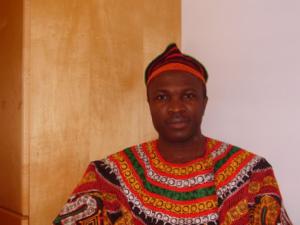
My current research was motivated by a number of events and experiences in my professional life in Cameroon, where I have worked in different capacities for fourteen years. During these years, I have had the opportunity not only to teach young learners and teenagers in state schools, but also to work as teacher trainer for primary school teachers and as a pedagogic inspector and language education policy maker at Ministry level. As a leading member of a national language teachers’ association (CAMELTA), I have also been able to dissipate the hierarchical positioning that my job at the Ministry of Basic Education imposes between teachers and myself by connecting with these teachers within our community of practitioners in ways that are non-hierarchical.
Working with teachers over these years, I have come to realise that my experience (of teaching large, under-resourced classes of more than 200 young learners) is not unique. Cameroonian teachers work in very difficult circumstances some of which are inconceivable to teachers in other parts of the world. With an initial training that is hardly reflective of the realities in the field; with classes of more than 100 pupils from a multiplicity of first language backgrounds; with the near absence of prescribed course books and pupils learning in very high temperatures; with only blackboard and chalk in a world where technological advancements are increasingly influencing classroom cultures, many Cameroonian teachers are still able to continue to achieve positive results through creative ways that respond to the realities of their working contexts. Working with these teachers over the years, I have come to the realisation that there are many teachers whose practices are the outcome not of their training but of their own responses to their previous experiences as learners, as well as to their particular contexts and classroom cultures. Pedagogic authorities may not approve of their practices on the basis of set-down policies but there is no doubt that learners are benefitting from these practices.
A report on my own experience of teaching 200+ teenagers in difficult circumstances is due to be published soon (Kuchah, K. and Smith, R. In press. 'Pedagogy of autonomy for difficult circumstances: Principles from practice', in Innovation in Language Learning and Teaching (May 2011)). The Pre-publication version can be found here
 .
.
You can also find a video and slides of the story of my teaching experience here .
.
Also see excerpts of my reflections on Professional development in Sub-Saharan Africa in (Kuchah, K. (2008) ‘Developing as a professional in Cameroon: Challenges and Vision’ in Garton, S. & K. Richards (Eds.). Professional Encounters in TESOL London: Palgrave Macmillan, pp.203-217.reproduced with permission of Palgrave Macmillan here .
.
My Current Research
Working Title: Investigating Features of Context Appropriate ELT Pedagogy in Large Classes: the case of English Medium Primary Schools in Cameroon
Funding: Warwick Postgraduate Research Scholarship (October 2009 to September 2012) & Ministry of Basic Education, Cameroon
(October 2009 to September 2012) & Ministry of Basic Education, Cameroon
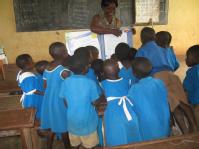
My PhD study (supervised by Dr Richard Smith , Dr Annamaria Pinter
, Dr Annamaria Pinter  and - previously - Shelagh Rixon) sets out to investigate features of context appropriate ESL pedagogy in Cameroonian primary schools, with the aim of informing ELT innovation policy in my country. To achieve this, I have been involved in two phases of data collection. In the first phase, I worked with seven primary school teachers, sitting in their classes for several weeks, observing their English language lessons, interviewing pupils in friendship groups, making videos of lessons and conducting stimulated recall interviews with teachers. Each teacher selected his/her most successful lesson from a series of lessons I videoed and this formed the basis for the interviews.
and - previously - Shelagh Rixon) sets out to investigate features of context appropriate ESL pedagogy in Cameroonian primary schools, with the aim of informing ELT innovation policy in my country. To achieve this, I have been involved in two phases of data collection. In the first phase, I worked with seven primary school teachers, sitting in their classes for several weeks, observing their English language lessons, interviewing pupils in friendship groups, making videos of lessons and conducting stimulated recall interviews with teachers. Each teacher selected his/her most successful lesson from a series of lessons I videoed and this formed the basis for the interviews.
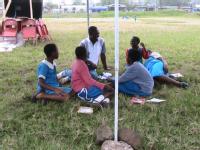
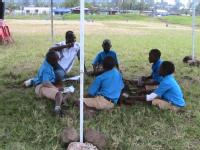
My most exciting experience in this phase was building friendships with children and getting to understand their perspectives about their teachers’ practices. This was done through taking part in their break time games, walking to and from school with groups of children, and other confidence- building activities that enabled me 'mutate' from a school inspector and researcher, to a friendly 'uncle' and confidant to whom they could relate.
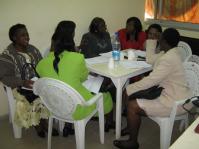 In the second phase, I organised two-day workshops with two groups of 20 teachers each. Participants watched videos of the successful lessons and commented on the positive/context appropriate features of each. This phase also offered me the opportunity to understand teachers’ real challenges and how they overcome them. It is now clear to me that these teachers (and their learners) possess shared, but also - in some respects - divergent notions of appropriate pedagogy which are largely different from Ministry of Education policies, and it is these notions (not what the Ministry says) that have the biggest impact on their practices. I am looking forward now to undertaking a thorough data analysis of the second phase data.
In the second phase, I organised two-day workshops with two groups of 20 teachers each. Participants watched videos of the successful lessons and commented on the positive/context appropriate features of each. This phase also offered me the opportunity to understand teachers’ real challenges and how they overcome them. It is now clear to me that these teachers (and their learners) possess shared, but also - in some respects - divergent notions of appropriate pedagogy which are largely different from Ministry of Education policies, and it is these notions (not what the Ministry says) that have the biggest impact on their practices. I am looking forward now to undertaking a thorough data analysis of the second phase data.
NB: All the photographs shown above are published here with the permission of participants.
